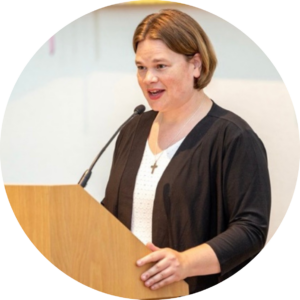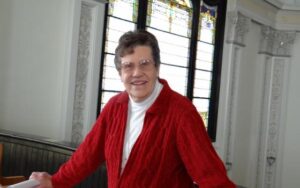The gifts wise women bring to the church

Rhonda Miska recently preached about the Epiphany at our monthly St. Phoebe Prayer Service for a Synodal Church. During this January 3 service, ministerial leaders from the region of St. Paul/Minneapolis, Minnesota reflected on the meaning and intersectionality of three stories: the story of the three magi who journey to encounter the Christ Child; the story of St. Phoebe, who journeyed from her home in Cenchrea to encounter the early Christian communities in Rome; and the story of our synodal journey in our present day Church in which wise and holy women come bearing gifts to a church in need of renewal. Rhonda’s preaching is presented here, along with video clips of the service. -Ellie
The story of Epiphany – the encounter across difference, the offering of gifts – and the story of St. Phoebe – her long journey, her courageous diaconal ministry – both speak to our story as at the beginning of 2023. We are on a synodal journey – and synod means walking together. We are on a journey as Discerning Deacons, part of this larger journey of the whole global church. We are walking together, trusting that the journey bears fruit, trusting that even though the destination isn’t clear, the journey itself brings graces. Trusting that we not only are accompanied by one another, but by a great cloud of witnesses – St. Phoebe, St. Mary Magdalen, Our Lady of Guadalupe, the Canaanite woman, and so many other faithful friends. At this point in the synodal journey we have completed a listening process. And in October we received a working document for the continental stage entitled “Enlarge the space of your tent” – the synthesis of what the people of God shared in the listening process, reflecting the wisdom and dignity of all the baptized.
The working document names a call for conversion in the church’s culture, and names the role of women as “critical and urgent.” The working document extends the invitation and encouragement to have conversations rethinking women’s participation in the church. This is the result of countless women and men around the world who spoke honestly, thoughtfully, prayerfully, courageously, and were heard and acknowledged. The document names and invites deeper exploration of the global expression that women’s participation needs to be considered and laments how women’s gifts aren’t being fully received. And the question of gifts – how they are offered and received – is a good one to ponder for the Feast of the Epiphany.
I imagine we have all experienced the delight and connection of a gift exchange that is joyful, mutual, and heartfelt. A gift given with love and sincerity and confidence. A gift received with gratitude and openness and true receptivity. Last year two friends of mine got their seven-year-old daughter Annika a new puppy for Christmas. The big moment on Christmas morning was captured on an iPhone video they shared. Annika squealed with disbelief. She was overcome by the news, and she didn’t know what to do first: to hug her mom, to hug her dad, to run and dance around the room in her pajamas. “A puppy! A puppy! A puppy!” she proclaimed. Both her parents wept with joy.
Gift giving and gift receiving at its best is marked by attunement, honoring, and openness on the part of the giver and receiver. Can you imagine the posture of the magi in offering their gifts? After such a long and uncertain journey, only a star to guide them, they have come to this foreign land of people with a different religion, different traditions, different language.
Can you imagine the posture of Mary and Joseph when they received gold, frankincense, and myrrh on behalf of their child? They were a poor couple, and their new relationship was marked by the scandal of pregnancy outside marriage, forced to bring the child into the world far from the comfort and familiarity of home. And now they are being offered treasure by these star-gazing strangers. Such a profound, vulnerable, beautiful exchange of gifts.
Church, at our very best, is a place where gifts can be given with confident humility and received with awe-filled delight, knowing God is the source of every gift, knowing we have a place in the body and everyone’s gifts are needed. At our very best, each of us is nurtured to offer what we can, and each of us receives the offerings of others with total receptivity and respect. At our very best, we know that we have what we need in abundance when each of us give and receive freely.
I bear witness to this giving every day in my life of ministry – I bet you do, too. The women who serve as chairs of parish councils. The women who serve as pastoral administrators. The women who offer their gifts in scholarship and academic work, teaching and publishing. The women who share their creative gifts in music, dance, visual art, liturgy. The women who serve on the boards or as leaders in Catholic organizations that offer spiritual care or do the work of justice and charity. The women who cook and serve funeral luncheons to offer support to grieving families. The women who organize fundraisers to support maternity centers in underserved communities, who host collections to provide food and toiletries for hospices that serve the poor, who receive prayer requests of all kinds and intercede tirelessly for others who are suffering. The women who keep vigil at detention centers and witness to the dignity of migrants. The women who work to increase accountability in policing to address systemic racism. The women who volunteer at pregnancy centers to walk alongside women who are uncertain and afraid. I bear witness to this giving every day – and on the Feast of the Epiphany, I rejoice in the giving and receiving of these gifts.
Yet of course, women’s gifts aren’t always received fully in the institutional church. Many of us have personally and painfully experienced this in our own lives. The synod working document for the continental stage names this sad reality. There are gifts women don’t offer because we have internalized messages that we can’t or shouldn’t be gifted in certain ways. And there are gifts women offer that aren’t received because of the structures that are in place.
There is a tragic gap between what is and what we dream of. This gap can leave us discouraged or even despairing, tempting us to give up hope dreaming of a different church. It can make us doubt that this truly is a new moment. In the face of this doubt or discouragement, especially among those who have been in the struggle for many decades, we need to walk alongside one another in sisterhood. The journey is uncertain and it feels vulnerable to hope and to organize – like the magi, we need the accompaniment of one another as we walk.
So together we work and pray and organize to move forward conversations about changing structures. And we simultaneously joyfully embrace the ways that women’s gifts are freely given and received in our lives, our ministries, our spheres of influence. When we’re told we can’t lead, we lead anyway. When we’re told we can’t preach, we preach anyway. We creatively and joyfully follow the call of the Spirit, remembering the faithful women who have gone before us, and share mutual encouragement among ourselves.
It was this desire for mutual encouragement of women’s gifts that led me to found the Catholic Women’s Preaching Circle in 2021. During my years of discernment and formation with the Dominican Sisters, I received the gift of witnessing women who claimed the identity of preacher, who collectively lived the charism of the Order of Preachers. I received the gift of graduate level education in preaching. I received the gift of life in community with women who encouraged one another as preachers. I grew to name this charism within myself. I noticed within myself ways that I had internalized the message that women don’t preach and how the Spirit steadily, gently led me to release that false message. And I felt a stirring to offer this gift to other women in ministry who hadn’t received the gifts of time in the Dominican community. Thanks be to God, two cohorts of the Catholic Women’s Preaching Circle have gathered for ten weeks each, and a third cohort is being formed. We build community, we commit to listening deeply and to accompanying one another, and we take turns preaching and receiving feedback. Gifts are given with confident humility. Gifts are received with awe and delight. We journey together. We become protagonists. The Word of God is broken open. The Body of Christ is strengthened. Stewarding the Circle is an honor and a grace – I bear witness to the offering and receiving of women’s gifts.
On this Epiphany, how will we joyfully celebrate the gifts of women? How will we give with confident humility and receive with awe and delight?

Rhonda Miska
Rhonda is a preacher, lay minister, spiritual director, and writer rooted in the Dominican tradition. She serves at the Church of St. Timothy in Blaine, MN, is a member of the Catholic Women Preach advisory board, and is the founder and co-convener of the Catholic Women’s Preaching Circle.
Enjoy these video clips from the January 3 St. Phoebe Prayer for a Synodal Church
Lisa Amman reflects on the journey of St. Phoebe to Rome
Rhonda Miska offers her reflection for The Epiphany
Jane Cavanaugh offers a visio divina with the image of three wise women


